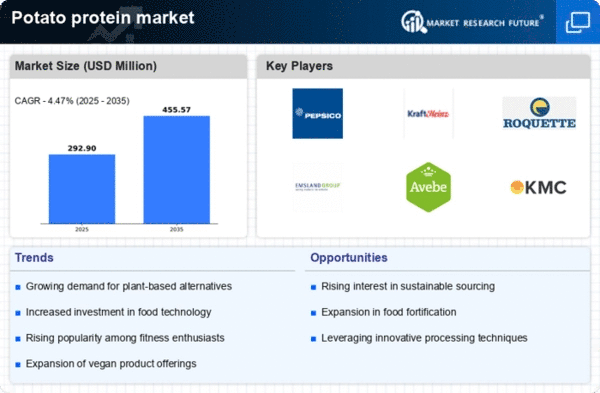Potato Protein Size
Potato protein market Growth Projections and Opportunities
The Potato Protein market experiences the influence of various factors that collectively shape its growth and dynamics. One primary driver is the increasing demand for plant-based proteins, driven by a growing emphasis on vegetarian and vegan lifestyles, coupled with a broader trend toward healthier eating habits. Potato protein, derived from potatoes, has gained prominence as a high-quality plant-based protein source, appealing to consumers seeking alternatives to traditional animal-based proteins. The market is fueled by the rising recognition of potato protein for its nutritional value, amino acid profile, and its allergen-free and gluten-free attributes. With a 4.88% CAGR between 2022–2030, the potato protein market is projected to reach USD 100.2 billion by 2030.
Technological advancements and innovations contribute significantly to the Potato Protein market. Advances in extraction methods and processing technologies have enhanced the efficiency of potato protein production, resulting in higher purity and improved functional properties. These innovations cater to the demand for clean-label and minimally processed plant-based ingredients, contributing to the diversification of applications in food and beverage products. Potato protein isolates and concentrates find utility in a variety of products, including meat alternatives, sports nutrition, and baked goods, expanding the market's reach.
Globalization and international trade play a pivotal role in the Potato Protein market. As the popularity of plant-based diets transcends geographical boundaries, there is a growing demand for potato protein on a global scale. Companies operating in the market must navigate diverse regulatory landscapes and meet varying consumer preferences in different regions. Additionally, the exchange of culinary influences and dietary trends across borders contributes to the versatility and adaptability of potato protein in various cuisines and food applications.
The increasing focus on health and wellness is another influential factor in the Potato Protein market. Consumers are more conscious of their protein intake and are actively seeking nutritious and sustainable alternatives. Potato protein's nutritional profile, low allergenicity, and suitability for various dietary preferences contribute to its appeal in the health and wellness space. Moreover, the environmentally friendly aspect of potato protein production, as compared to certain animal-based proteins, aligns with sustainability goals, attracting environmentally conscious consumers.
Sustainability considerations and environmental awareness represent emerging factors in the Potato Protein market. As consumers prioritize eco-friendly practices, the sustainable sourcing of raw materials and environmentally responsible production methods become critical for companies in the market. The potato protein industry, with its potential to utilize potato waste streams and by-products, contributes to a more circular and sustainable approach in protein production.
Despite the positive trends, challenges exist in the Potato Protein market. The availability and cost of raw materials, influenced by factors such as potato crop yields and market dynamics, can impact production and pricing. Additionally, competition from other plant-based protein sources and the need for consumer education regarding the benefits of potato protein present challenges for market players.



















Leave a Comment